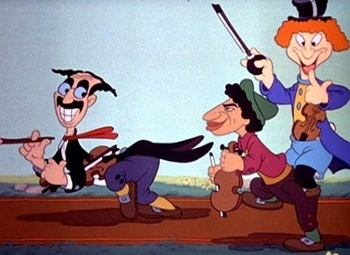A Year in Shorts Day 241: "Mother Goose Goes Hollywood"
Even though most everyone agrees pop culture references are the lowest form of humor, the Academy certainly couldn’t get enough of them. How many Oscar-nominated cartoons have we watched in which the comedy is primarily derived from caricatures of Hollywood celebrities? Too many if you ask me. And the 1938 Silly Symphony Mother Goose Goes to Hollywood is yet another to throw onto the pile.
The premise of Mother Goose Goes Hollywood is exceedingly simple, if fairly unusual for one of the Silly Symphonies. Directed by Wilfred Jackson, the short is basically a series of skits adapting various nursery rhymes, with the various roles being filled in by caricatures of Hollywood celebrities. It's worth noting that the idea of combining nursery rhymes with celebrity caricatures is hardly a new one; Walter Lantz did it five years earlier with the Oswald the Lucky Rabbit short, The Merry Old Soul. Ordinarily I would take Disney to task for being so unoriginal, but since Oswald the Lucky Rabbit was more or less stolen from him, I guess turnabout is fair play. And honestly, it isn't as if the idea was particularly inspired either time. Still, fans of 1930s cinema might get a kick out of it.
In more ways than one, this short has not aged well at all. Part of that comes from the reliance on contemporary pop culture references, of course. Oh sure, the Marx Brothers are timeless, but jokes about Mutiny on the Bounty or Captains Courageous? And who remembers W.C. Fields and Charlie McCarthy from anything aside from their cameo in The Muppet Movie? Then there are the elements that have aged even worse; namely, the racism. God forbid we have a cartoon without racism! Now some have argued that the caricatures of black celebrities such as Fats Waller or Cab Calloway aren't really racist, as they're no more exaggerated or looked down upon than the white celebrities. And I suppose that's true to an extent. Still, you can't include a Stepin Fetchit reference in your film and NOT have it be racist, can you? And no one has tried to defend the Katharine Hepburn in black face gag. Not only is the gag horribly offensive, it's also inaccurate; Katharine Hepburn only did yellow face.
Eventually the short seems to lose interest in its own premise, ending in a big dance number with even more celebrity caricatures. (What is this, a Dreamworks film?) Some of the celebrities aren't even part of a nursery rhyme; Fred Astaire, for instance, just shows up to dance. This bit is also pretty racist, as there's an attempt at a call and response with Stepin Fetchit, who can't tap at all. Considering that Astaire himself would have told you that he owed a great debt to Bill "Bojangles" Robinson (even going so far as to don blackface in Swing Time as part of a misguided homage), this feels like a missed opportunity. Perhaps I'm reading too much into this (considering how many paragraphs I've written on a disposable cartoon, there's a good chance I am), but considering the fact that tap has its roots so deeply in Black culture, it's too bad the short decided to go for a cheap gag rather than to pay some respects to its origins. I'm sure the filmmakers didn't intend to imply that white people are better at tap dancing than Black people, but that's hardly an excuse, is it?
(via Giphy)
But the main problem with that short is that it's simply not right for the Silly Symphonies. The shorts in that series we've looked at were many things, but they weren't gag-driven, you know? Sure, some of them were funny, but the jokes weren't the point. The Silly Symphonies were primarily made push the studio's animation abilities; they were made for the art, not for the laughs. Even the more comedic shorts were built around the animation first, jokes second. And while I suppose there is something impressive about the celebrity caricatures, that's not really enough. Plus, the animation in this short is considerably worse than most Silly Symphonies anyway. I don't know, there's just something about the way Disney animated humans in the 30s which I absolutely fucking hate. Remember the Prince in Snow White? Disgusting. I think it's the hands. They're just so overly detailed, they look horrifying. I guess they had this problem in the 40s too, but Pinocchio and Dumbo are better movies than Snow White, so I think it's more acceptable there.
There are some things to enjoy in Mother Goose Goes Hollywood. It's pretty colorful, it moves quickly, and it's funny enough in some places, even if the film relies on watered down gags from actually funny people. Plus there's something kind of funny about the fact that this film has "Katharine Hepburn" and "Spencer Tracy" share the screen together long before their partnership both on and off screen. Weird how the film's best in-joke is entirely unintentional. Still, most of the enjoyment from this film depends on your ability to recognize pop culture references and what emotional reaction that inspires in you. It's basically the Ready Player One of animated shorts. And nobody wants that.
Keep up with the Oscar Baiting here on Letterboxd!
The Great Oscar Baiter is a not-for-profit work of criticism. All images herein are property of their respective owners and are protected under Fair Use.




Comments
Post a Comment